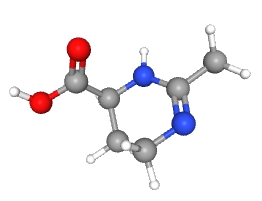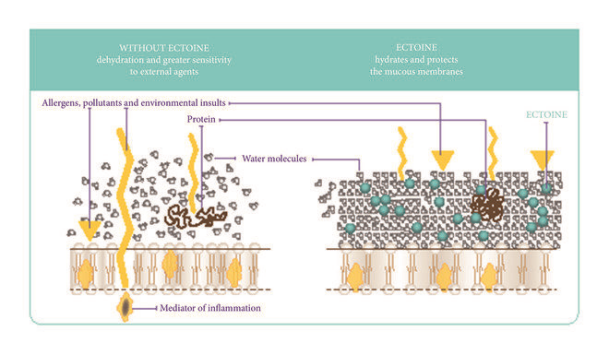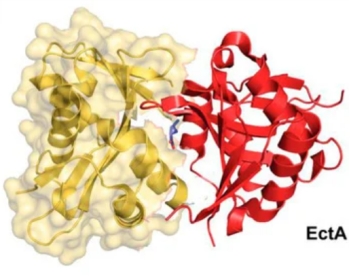The Physicochemical Properties and Application Scenarios of Ectoin ( CAS : 96702-03-3 )
Time:2024-04-12 Hits:95
Ectoin is a substance found in halophilic bacteria that helps them balance osmotic pressure. It's become a popular ingredient in various industries, including cosmetics, medicine, and scientific research. In fact, it made its way into the 2021 edition of the "Catalogue of Used Cosmetic Raw Materials." In cosmetics, especially, Ectoin has gained significant attention. It offers numerous benefits like anti-aging, UV protection, antioxidant properties, moisturization, and inflammation reduction. Because of these advantages, many cosmetics companies, including prestigious brands like Estee Lauder and Shiseido, have embraced Ectoin and incorporated it into their products.

Physical and chemical properties
|
Alias
|
Tetrahydromethylpyrimidinecarboxylic acid
|
|
English name
|
Ectoin
|
|
Molecular formula
|
C6H10N2O2
|
|
CAS number
|
96702-03-3
|
|
Molecular weight
|
142.16
|
|
Exterior
|
white crystal or powder
|
|
Melting point
|
280℃
|
|
Solubility
|
Soluble in water, glycerin, propylene glycol, ethanol, etc.
|
|
Storage
|
Store in a sealed container at room temperature, in a cool, dry place
|
|
Product
|
Molecular formula
|
CAS number
|
level
|
Packaging
|
|
Ectoin
|
C6H10N2O2
|
96702-03-3
|
Cosmetic grade
|
1kg 25kg
|
|
Ectoin
|
C6H10N2O2
|
96702-03-3
|
Medical grade
|
500g 1kg
|
For more product details, please contact us: service@seebio.cn or Phone: +86 21 58183719 or Wechat: +86 158 0195 7578
Advantages of Ectoin in Skincare:
1. Moisturizing Effect: Ectoin serves as a potent moisturizer, aiding the skin in retaining moisture and boosting its overall hydration levels. This helps alleviate dryness and the sensation of tightness.
2. Osmotic Pressure Protection: Acting as a safeguard against osmotic pressure imbalances within living organisms, Ectoin plays a vital role in maintaining cellular water balance. In skincare, this protection shields the skin from harsh environmental conditions like dryness, cold, or heat.
3. Anti-Stress Effect: Ectoine's ability to help organisms endure high-salt environments extends to skincare, where it is valued for its capacity to fortify the skin against stressors such as pollution and ultraviolet radiation.
4. Protein Structure Stabilization: Ectoin exhibits the capability to stabilize protein structures, making it a valuable addition to skincare formulations containing active peptides or enzymes. This ensures the stability and effectiveness of these key ingredients.
5. Anti-Aging Properties: Ectoin shows promise in diminishing the appearance of fine lines and wrinkles, thereby addressing common signs of skin aging.
6. Mildness: Widely recognized for its gentle nature, Ectoin is suitable for all skin types, including sensitive skin, making it a versatile ingredient in skincare products.
7. Enhanced Efficacy of Ingredients: Ectoin has the ability to enhance the penetration and effectiveness of other skincare ingredients, thereby maximizing the overall efficacy of skincare formulations.
Applications of Ectoin in the Cosmetics Industry
Anti-Wrinkle Effect:
Ectoin proves highly effective in enhancing the anti-wrinkle and moisturizing properties of cosmetic formulations. When combined with ingredients like Boseine, ergothioneine, and citrus fruit extract, Ectoin amplifies the overall efficacy of the formulation, resulting in firmer, smoother skin with reduced wrinkles. Its application in anti-wrinkle soothing skin care nanoemulsions demonstrates exceptional skin absorption capabilities. When incorporated with oil phase ingredients such as polyoxyethylene castor oil and isopropyl myristate, Ectoin achieves better distribution within the microemulsion system, effectively penetrating deeper layers of the skin for enhanced anti-wrinkle and moisturizing effects.
Moisturizing, Whitening, and Multiple Functions:
Ectoine showcases multifunctional benefits when incorporated into cosmetic compositions. Paired with Coenzyme Q10, it not only deeply moisturizes and hydrates the skin but also boosts whitening effects and combats skin aging. Additionally, the formulation addresses acne, wrinkles, and sagging, providing comprehensive skin care. Its non-sticky texture post-application ensures a refreshing and comfortable user experience. As an active ingredient, Ectoin synergizes with Coenzyme Q10 to deliver a range of benefits including moisturizing, whitening, and anti-aging effects.
Skin Barrier Repair Effect:
Ectoin plays a pivotal role in skin care formulations aimed at repairing the skin barrier. When combined with Arctic seaweed extract and glyceryl glucoside, it significantly promotes the expression of silk fibroin FLG, reducing the epidermal dehydration rate and effectively repairing the damaged skin barrier. These ingredients possess exceptional restorative properties, addressing various skin concerns at their root. Furthermore, the composition lends itself to diverse skin care preparations tailored to meet specific skin needs.
Anti-Acne Effect:
Ectoin exhibits multifaceted functions in anti-acne formulations, offering antibacterial and reparative properties while effectively combating acne and facilitating wound healing. This anti-acne formula combines Ectoin and SOD to create a potent substance capable of deeply penetrating the skin to deliver anti-inflammatory, sterilizing, and reparative effects. Additionally, hydrocolloid components like sodium carboxymethyl cellulose, polyvinyl alcohol, glycerin, liquid paraffin, and water provide moisture and protection to the skin, alleviating discomfort associated with acne symptoms.
Sensitive Skin Care:
When integrated with anionic surfactants, Ectoin serves as an active ingredient in cleansing cosmetics, significantly reducing potential irritation. This complex not only decreases skin irritation by approximately 20% but also diminishes model sebum solubility by 10-20%, thereby preserving the skin's hydrolipidic barrier. Moreover, the addition of Ectoin can reduce surfactant cytotoxicity by up to 60%, enhancing product safety. As a modern ingredient, Ectoin is poised to enhance the safety of clean cosmetics, particularly in the care of sensitive skin such as atopic skin.
Skin Soothing Effect:
Ectoin assumes a pivotal role in conferring skin-soothing properties to formulations. It forms a protective, nourishing, and stabilizing hydration layer around cells, enzymes, proteins, and other biomolecules, offering comprehensive skin protection. This characteristic enables Ectoin to effectively calm and soothe irritated and damaged skin, providing relief from skin discomfort. Furthermore, the inclusion of madecassoside and licorice root extracts in the formula further enhances its skin repair, anti-inflammatory, and soothing properties, respectively. Working synergistically with Ectoin, they address redness, itching, and irritation, promoting skin repair and restoring its health.
Pharmaceutical Industry Applications
Auxiliary Rhinitis Treatment:

Ectoine exhibits promising potential in topical delivery for upper respiratory tract (URT) mucosa, offering adjunctive therapy for acute and chronic inflammatory conditions like allergic rhinitis (AR) and rhinosinusitis (ARS). Its moisturizing and anti-inflammatory properties show promise in alleviating symptoms, particularly in sinus disease treatment, thus enhancing patient comfort and endoscopic outcomes. However, further studies are warranted to validate these findings due to the limited current research.
Auxiliary Eye Inflammation Treatment:
Ectoin demonstrates exceptional prowess in safeguarding proteins and biofilms from environmental stressors. It has garnered significant attention for its efficacy in addressing ocular surface irritation and inflammation. Clinical trials have underscored the effectiveness of Ectoin Eye Drops in managing allergic conjunctivitis and other forms of non-specific ocular inflammation, including post-surgical inflammation. Patients using ectoine-containing eye drops experienced notable improvements in symptoms like allergic rhinoconjunctivitis and postoperative ocular conditions. Moreover, when used in conjunction with antihistamines, ectoine accelerates symptom relief in allergic patients, and when combined with antibiotics, it expedites wound healing. As a well-tolerated and safe natural substance, ectoine presents a promising treatment option for individuals grappling with ocular surface inflammation and irritation.
Scientific Research
Osmotic Protection and Moisturizing:

Ectoine and its derivatives serve as pivotal components in microorganisms' adaptation to environmental osmotic pressure fluctuations. Acting as compatible solutes, these compounds accumulate within cells during hypertonic conditions, effectively countering water loss and cytoplasmic dehydration. This process preserves cell turgor pressure and ensures proper cell function. Ectoine's exceptional function-preserving properties extend its utility beyond stress protection for microorganisms, holding promising application prospects in biotechnology, skincare, and medicine.
Cell Protection Function:
Ectoine, as a uniquely compatible solute crucial for microorganisms under extreme conditions, demonstrates remarkable cell protection functions. It withstands the impact of harsh environmental factors like high salinity and osmotic pressure changes while effectively responding to external stressors such as allergic stimuli, thereby fortifying cellular defenses. Ectoine not only maintains cell shape and function but also stabilizes macromolecules like functional enzymes, ensuring their activity and stability under extreme conditions. This characteristic positions ectoine for diverse applications in cosmetics and beyond.
Resistance to UV Radiation Damage:
Ectoine acts as a small molecule ion penetrant and compatible solute, preserving cell metabolism under quasi-physiological conditions. Research indicates a significant interaction between ectoine and DNA, impacting the effects of ultraviolet radiation on DNA damage. In phosphate-buffered saline (PBS), ectoine demonstrates effective protection against base damage. Conversely, in pure water, the addition of ectoine alters DNA damage from single-strand breaks to base damage. Further experimental evidence supports direct ectoine-DNA interaction, influencing the type and extent of DNA damage induced by ultraviolet light.
Super Moisturizing and Water-Locking Ability:
Ectoin's exceptional moisturizing and water-locking capabilities have garnered significant attention from numerous brands. Its unique amphiphilic amino acid molecules possess the ability to trap a substantial amount of three-dimensional clustered water. This "clustered water," present in the stratum corneum, offers long-lasting moisturization unaffected by fluctuations in external environmental humidity and temperature. Remarkably, even under simulated conditions of 97 degrees, this moisture remains intact.
Human studies have demonstrated the remarkable efficacy of Ectoin. Volunteers using formulations containing 0.5% and 1.0% Ectoin maintained skin moisture levels at an astonishing 60% on day 19, 12 days after discontinuing product use, compared to a control group using regular moisturizers. This underscores Ectoin's potent water-locking and moisturizing abilities, effectively safeguarding the skin's stratum corneum barrier function and minimizing water loss.
While Ectoin is not specifically marketed for its anti-aging properties, experiments involving a group of volunteers revealed significant reductions in wrinkles and increased skin smoothness after one month of application, particularly in the crow's feet area around the eyes. These findings highlight the additional benefits of Ectoin beyond its primary moisturizing function, further enhancing its appeal in skincare formulations.
|
Parameter
|
% Change using Natural Cream containing 0.5% Ectoin
|
Changes in Placebo Cream % Use
|
% Change between Cream containing 0.5% Ectoin Natural and Placebo
|
|
Average wrinkle depth (μm)
|
-19%
|
+13%
|
-32%
|
|
Deepest wrinkle (μm)
|
-3%
|
+14%
|
-17%
|
|
Wrinkle volume (mm³)
|
-21%
|
+19%
|
-40%
|
|
Wrinkle depth (Wt) (μm)
|
-22%
|
+8%
|
-30%
|
|
Average roughness (Rz) (μm)
|
-8%
|
+27%
|
-35%
|